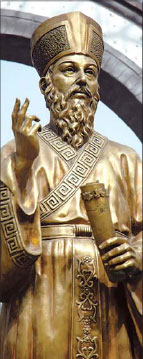Seven stars for Zhaoqing
A wise man from the West
Italian Jesuit priest Matteo Ricci was a pioneering expat who compiled the first European-Chinese dictionary, by inventing a system of Romanization and adding tones, and created the first European-style map of the world in Chinese known as the Impossible Black Tulip.
Ricci was sent to Zhaoqing in 1583 and lived in China until his death 400 years ago this month, at the age of 58. He became an advisor to the imperial court and was the first Westerner to be invited into the Forbidden City.

He introduced Western-style clocks that so fascinated the Emperor Wanli (1563-1620) he would stare at his for hours on end waiting for it to chime, and developed China's understanding of astronomy after he accurately predicted an eclipse.
Fittingly, perhaps, he was the first foreigner to be buried in Ming Dynasty (1368-1644) China, as it was policy at the time to ferry the corpses of foreigners to Macao. Today, his tombstone can be found in the Beijing Administrative College courtyard.
Italian priest Matteo Ricci (Li Madou). Huang Huo / Asia News Photo
Ricci's journey to the East began in Italy's Macerata, which was then part of the Papal States. He studied to be a priest and elected to do missionary work, first traveling to Goa, in India, and then to what was the Portuguese trading post of Macao.
He applied himself to the study of Chinese, believing that only by understanding the language would he understand the mindset of the people. He would later become the first person to translate the Confucian classics into Latin. He also introduced the Chinese word for the Christian God, "tianzhu", or "Lord of Heaven", after he heard one of his followers use the word.
Invited by the then governor of Zhaoqing, Wang Pan, Ricci shaved his head and face and dressed like a Chinese scholar before traveling to the city, which was the administrative center of Guangdong at the time.
Ricci had his heart set on converting China to Christianity, but Wang was far more interested in his mathematical and cartographic prowess. Ricci's mission from the point of view of proselytizing was a failure, partly because, like others who would follow, he was changed by China rather than being an agent of change.
After Ricci's death the church questioned his acceptance of ancestor worship and then banned it in 1705. The then emperor retaliated by banning Christian missions, thereby closing the door Ricci had worked so hard and long to open. Though, arguably, his legacy as a pioneer of Sino-European cultural exchanges is more important.
In Zhaoqing, the "Servant of God", who is in line for beatification by the Pope, is known by his Chinese name of Li Madou, and if you ask people on the street they will point you to the Ricci Memorial Center.
The centrally located museum is a storied monument to one of the city's most important historical figures. The building dates back to 1118 and was rebuilt in 1462. It was here the last of the Ming emperors ascended the throne, in 1646. It is often referred to as the Red Mansion, on account of its color.
The paint is peeling and the exhibits are mostly vinyl, color plates of the priest's life and work (in Chinese only), with a few dioramas, such as "Li Madou meets the governor" and "Li Madou presents a map" - but it gives a flavor of the man and his times.
For pilgrims there is a fading Ricci memorial plaque where he used to live, near a riverside pagoda tower that is currently being renovated. There are also churches, though none still extant, built by Ricci.
One of the prettiest is Le Zhu Wei Catholic Church, constructed in 1905. It's a bit of trek to get there but worth it for the walk by West River and the dilapidated Ming Dynasty buildings that frame the site, along with an ancient banyan tree. This is real history, not the refurbished kind, and all the better for that.
 0
0 








Go to Forum >>0 Comments